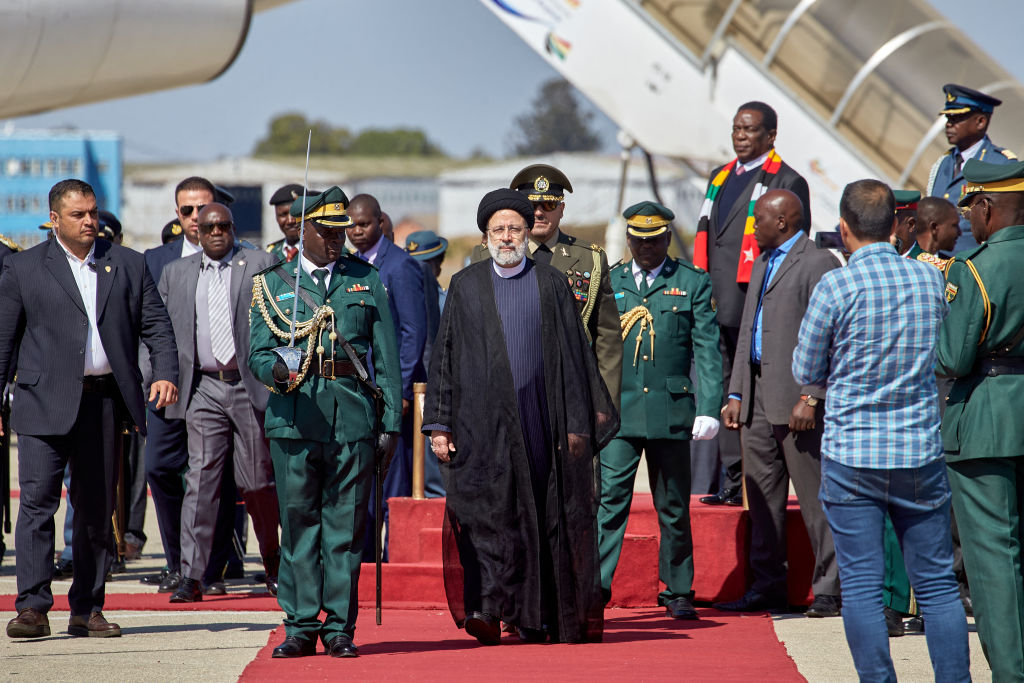ADF STAFF
Iranian President Ebrahim Raisi’s three-country tour of Africa in mid-July marked the first time the controversial country’s president has visited the continent in more than 11 years.
Raisi’s government has made a point of seeking closer ties with Africa and has increased trade. But Iran’s connection to extremism, arms and drug smuggling on the continent undercut those relationships.
“Sanctions have been hurting Iran for a long time, but the Raisi administration’s top priority is to defeat the sanctions,” Tehran-based researcher Ali Akbar Dareini of Al Jazeera’s Center for Strategic Studies said during an Al Jazeera panel discussion on July 12. “His tour of Africa represents a major strategic shift in Iran’s foreign policy.”
Raisi visited Kenya, Uganda and Zimbabwe in July and attended the BRICS summit in August. BRICS is an acronym for the grouping of Brazil, Russia, India, China and South Africa, which was added in 2010.
During the 2023 summit in Johannesburg, BRICS invited Argentina, Egypt, Ethiopia, Iran, Saudi Arabia and the United Arab Emirates (UAE) to become new members.
Dr. Samuel Ramani, an associate fellow at the Royal United Services Institute, said that while Iran is growing its presence in Africa, its destabilizing activities and reputation as a malign actor hinder its ability to expand influence.
“Despite Iran’s commitment to a greater presence in Africa, Tehran’s strategy on the continent is riddled with contradictions,” Ramani wrote in an opinion piece for the Gulf International Forum. “Iran’s dual role as both an aspiring regional partner and a force of chaos continues to restrict the depth of its partnerships in Africa.”
Observers have long accused Iran of fomenting sectarian tension in the Middle East through proxies. In recent years, its activities in Africa have evoked similar accusations.
“Iran is working to build land corridors across the region in order to improve its capacity to move fighters and supplies from one battlefield to the next,” the Morocco World News reported in 2022.
Morocco is one of Iran’s loudest opponents in Africa. It cut ties with Iran in 2018, citing “irrefutable proof” that through its Lebanon-based proxy group Hezbollah, Iran provided military training and logistical support to the Polisario Front, the Western Sahara separatist group based in Algeria.
Ramani said Hezbollah remains heavily involved in West African smuggling networks, with Côte d’Ivoire emerging as a hub of narcotics trafficking and money laundering.
“Hezbollah’s arms and narcotics trafficking extend to other West African countries, such as Guinea, Togo, Guinea-Bissau and Sierra Leone, and are part of a global operation that nets the militant group $1 billion each year,” Ramani wrote.
Iran also has built a smuggling network for illegal weapons in the Horn of Africa, which extends to countries throughout the continent. Iran sold its Mohajer-6 military drones to the Ethiopian army during its civil war with the Tigray region.
“Iran’s arms shipments to non-state actors have been viewed with suspicion by many across Africa,” Ramani wrote. “Iran’s establishment of a proxy network in Somalia, which has allegedly funneled arms to Yemen’s Houthi rebels and to other clients throughout East Africa, is the most noteworthy example of Tehran’s policy of weapons proliferation.”
Iran has been accused of plotting attacks and at least one assassination on African soil. In 2021, Ethiopia seized weapons and explosives and arrested 15 people who planned to attack the UAE embassy in Addis Ababa. Authorities said a second group was planning to attack the UAE embassy in Sudan.
In November 2022, authorities in Ghana, Senegal and Tanzania arrested five suspected agents of Iran’s Quds Force, a branch of its Islamic Revolutionary Guards Corps, for allegedly plotting to carry out attacks against tourists and businesspeople.
Experts say another Iranian export — its radical version of Islamic ideology — undermines its presence in Africa and makes countries hesitant to deepen ties with Iran.
“Iran is perceived as a malign actor by many governments in Africa largely due to its efforts to export its favored version of political Islam, making them suspicious of Iran’s intentions and reluctant to embrace it as a trusted partner,” Iranian journalist Kourosh Ziabari wrote for the Arab Gulf States Institute think tank in May 2023.

